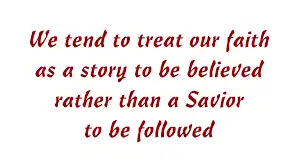
A tremendous amount of mud-slinging is currently going on in the Church these days. I’ve addressed that topic in multiple articles here on Miscellaneous Ramblings.
In case you’ve missed any of them, here’s a brief list for your reading enjoyment and — I hope! — spiritual edification:
- Of Blind Men & Elephants
- Filled With The Troll-y Spirit
- The Saints Who Say “NIH!”
- Worshiptainment
- Guardians of the Orthodoxy
- Go Away or I Shall Taunt You A Second Time-a!
I’m a bit sensitized to the topic because of that old counseling proverb, “Spot it, you got it!” You see, I, too, used to be one of those hurlers of weaponized moistened soil until the Lord convicted me of my sins in that area.
By His mercy, I repented. Others, tragically, have not been so convicted — or far, FAR worse, have hardened their hearts against such conviction — and remain unrepentant.
There but for the grace of God…
 A good deal of vitriol has been leveled at the current worldwide revival now in progress. Some of the most vicious attacks have been leveled at someone who many consider to be the poster-child of that movement, Pastor Bill Johnson of Bethel Church in Redding, CA (hereafter “Bethel”).
A good deal of vitriol has been leveled at the current worldwide revival now in progress. Some of the most vicious attacks have been leveled at someone who many consider to be the poster-child of that movement, Pastor Bill Johnson of Bethel Church in Redding, CA (hereafter “Bethel”).
One of the many accusations tossed their way is that of Bethel being a cult.
In a previous article, I put Roman Catholicism under the cult microscope and soon determined the Protestant Reformers were right all along. By all measurable standards, the RC belief system is indeed apostate on its face and remains so to this very day. No amount of ecumenical lipstick will make that heretical pig even one bit prettier theologically.
In this article, I’ve felt led of the Spirit to apply to Bethel the selfsame standards for “cult-likeness” I used in that article. My goal is to either establish or refute such accusations against them once and for all.
My qualifications for making such an evaluation are well over 200 hours of listening to sermons by Bill Johnson and his associate ministers on a wide variety of topics in an equally wide variety of ministry settings. Several of those videos I’ve heard more than once. Those who would contest my opinion rarely have more to offer than mere sound-bites taken out of context, so I have nothing to fear from them.
This is not rocket surgery. It all boils down to the answers to 2 simple questions:
- What are the major earmarks of a cult system?
- How do the teachings and behaviors of Bethel stack up against that list?
Let’s get started!
The Earmarks of a Cult
Cult systems tend to exhibit these 5 primary characteristics:
- They exalt extra-biblical writings or traditions as equal or superior to the Scriptures. They also create theological and doctrinal constructs which are clearly contradictory to the plain reading of Scripture and the accurate definitions of words in the original languages (e.g., they say it actually doesn’t mean that, but means this instead). Some claim their “revelation” is superior to and/or supercedes the Word.
Some cults edit the Bible itself, creating their own versions edited to support their doctrinal errors (e.g., they claim the translators got it wrong, etc.). The best modern-day examples of this are the Mormons and Jehovah’s Witnesses.
- Cults present an unscriptural view of the Person & works of Christ. In other words, they may sound Christian at first blush, but at the core they conceptually have the wrong Jesus.
- They impose a system of “salvation by works” upon its followers. There is always a list of things (do this, don’t do that, cut this off, grow that out aka dead religious works) its followers must do or avoid in order to qualify for entering heaven.
- Cults impose its belief system upon its followers through psychological manipulation and/or physical force. Brainwashing and abuse of all kinds (physical, verbal, emotional, psychological, religious, sexual) are the norm rather than the exception.
- Most cults have a single powerful founder/leader who declares himself — or is declared by others — to be God/Jesus incarnate on this earth (e.g., Moses David, David Koresh, Jim Jones, the Pope, etc.).
How Does Bethel Measure Up?
Let’s examine each of them in turn:
- Does Bethel exalt extra-biblical writings or traditions as equal or superior to the Scriptures?
In a word, no.
 In all the Bethel messages I’ve listened to, I’ve never once heard anyone even hint at the idea. They exalt the Protestant Bible as the — repeat THE — Word of God and that it is the supreme authority over faith and practice for all Christ-followers. They preach that it says what it means and means what it says.
In all the Bethel messages I’ve listened to, I’ve never once heard anyone even hint at the idea. They exalt the Protestant Bible as the — repeat THE — Word of God and that it is the supreme authority over faith and practice for all Christ-followers. They preach that it says what it means and means what it says.All extra-biblical utterances, such as the gift of tongues and their interpretation and prophesy are subject to scrutiny against — and rejected if it fails to measure up to — both the spirit and letter of the written Word in context.
All this is as it should be.
Are their doctrinal positions in agreement with the clear reading of Scripture?
In another word, yes.
I’ve repeatedly heard Bill Johnson express his intense love for both the Word and his passionate studies in it. Not one Bethel minister has ever once exalted another written book or document to scriptural or near-scriptural status within my hearing. Never I have heard any of them utter the phrase, “But this passage doesn’t really mean that” or words to that effect.
Neither have I heard any of them cite any past historical figure as doctrinally authoritative on any given topic (as do Calvinists, etc.), though I’ve heard several of those figures honored as the theological giants upon whose shoulders we stand today.
 Does all that imply Bethel has a perfect understanding of all the Scriptures and everything there is to know about the Godhead? Nope, not a chance!
Does all that imply Bethel has a perfect understanding of all the Scriptures and everything there is to know about the Godhead? Nope, not a chance! Bill Johnson is especially humble in this regard, stating our faith in divine mysteries despite our inability to grasp them intellectually is a sign of the child-likeness Jesus exhorted us to exhibit. When using the term “divine mysteries,” he is not referring to arcane Gnostic or New Age nonsense, but the kinds of mysteries we all encounter in the Scriptures. These range from doctrinal ones (e.g., the Trinity, Jesus became sin on the Cross, the hypostatic union, etc.) to practical ones, such as why a given situation didn’t work out the way we thought it should have and so on.
- Does Bethel present an unscriptural view of the Person & works of Jesus Christ?
Again, no.
Their views may slightly differ from traditional views of Him, but all their teachings are firmly rooted in Scripture. I’ve never heard even one hint of anything detracting from or altering either the nature and ministry of the Person of Jesus or the finished work of His cross, resurrection, and exaltation.
Most Bethel critics view what the Scriptures say about Jesus through the lenses of their centuries-old church traditions and powerless theologies. Many of those critics’ doctrinal positions are right on the money. Others? Not so much! Their major disagreements with Bethel tend to be differences over the “not so much” parts.
- Does Bethel impose a system of “salvation by works” upon its followers?
 Not even close!
Not even close! More than any other Christian group I’ve encountered during the 50 years I’ve been following Jesus (as of this writing), I cannot recall a bunch of folks more dedicated to the concept of divine grace than Bethel.
- Does Bethel impose its belief system upon its followers through psychological manipulation and/or physical force?
Absolutely not!
As both a Christian counselor and survivor of bullying, I’m hyper-sensitive to all such mind-games. If I even get a whiff of such junk, I’m out of there like a shot!
If anything, Bethel emphasizes how guilt and shame are lousy motivators straight from the pit of hell, the precise opposite of all such manipulations. And you don’t see the kind of freedom I’ve witnessed in their services when there’s any hint of coercion present.
- Does Bethel have a single powerful founder/leader who declares himself — or is declared by others — to be God/Jesus incarnate on this earth?
 Not that I’ve ever seen.
Not that I’ve ever seen. Some folks regard Johnson has a modern-day prophet, but certainly not a reincarnation of Jesus! But no one, repeat NO ONE, I’ve heard — including Bill himself — has even hinted at this idea!
When I see Bill Johnson, I see one of the most humble and Christ-like ministers I’ve ever encountered in my 5+ decades of serving Jesus. If all of his critics demonstrated the same kind of attitudes that he does, this article would be entirely superfluous. Just saying… 😊
Is They Is or Is They Ain’t?
I think by now you’ve grasped my verdict on this issue. Using the 5 qualifications for “cultness” I’ve listed above, Bethel not only fails to meet any of those criteria, they don’t even come close!
You may disagree with some of their doctrinal positions.
That’s OK.
You may prefer to attend a more reserved, conservative, and/or traditional church because charismata freaks you out.
That’s OK, too.
You may see an occasional flaw in their grasp of church history — as I occasionally do — or find their teaching style not your cup of tea.
Even that’s OK.
What’s not OK is casually tossing around labels like “heretics” and “cult” without doing a serious examination of what is actually being taught before tarring our brothers and sisters in Christ with them.
And that is where Bethel’s critics completely miss the mark. Never once have I heard any critic:
- Accurately articulate what Bethel actually teaches, and;
- Deliver a calm, well-reasoned, and hermeneutically sound refutation from the Scriptures.
All I’ve ever heard from any of them are strawman arguments, ad hominem attacks, and cherry-picked sound-bites taken out of their context, as well as demonstrating a host of other cognitive biases and logical fallacies — all propaganda techniques, I might add — up to and including The Big Lie.
If that isn’t enough, when I examine the attitudes and behaviors on each side, I see the fruit of the Spirit being evidenced by Bill Johnson and the works of the flesh by his opponents. Selah!
In other words, a collective epic FAIL by the critics on all counts!
By all means, don’t take my word for any of this. Check out Bill Johnson’s YouTube channel or Bethel’s and see for yourself! During one evening service, they literally spent an hour water-baptizing folks non-stop. When was the last time you saw that in your local church service? I certainly haven’t!
I’ve embedded one of his sermons here because it addresses many of the issues I’ve covered in this article:
If it refuses to load here, here’s the link to it on YouTube.
If you still disagree with me afterwards, please feel free to address your concerns — respectfully, mind you! — in the comments below.
I leave you with this final thought:
Prayer shapes us. The main thing about prayer is not convincing God to do anything. The main thing about prayer is that it shapes me; it shapes how I think. Faith gets answers, but enduring faith gets answers with character. Delayed answers gain interest, but they also prune the soul; they also prune the heart. And the pruning of the heart in delayed answers is essential.
Desperation either leads to breakthrough or unbelief.
The passion of the soul that is dependent on an answer to be satisfied usually leads to unbelief.
The passion of the soul that leads to a Person ends up transformed.
Bill Johnson
Thanks for reading!

